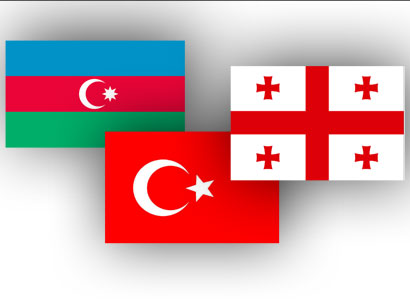Azerbaijan, Baku, March 29 / Trend, E.Tariverdiyeva /
Azerbaijani, Turkish and Georgian foreign ministers reiterated the importance of rapid resolution of the Nagorno-Karabakh conflict, Azerbaijani Foreign Ministry's website reported on Friday.
On March 28, 2013, the Second Trilateral Meeting of Ministers of Foreign Affairs was held in Batumi, hosted by Maia Panjikidze, the Minister of Foreign Affairs of Georgia, and with participation of Elmar Mammadyarov, the Minister of Foreign Affairs of the Republic of Azerbaijan, and Ahmet Davutoglu, the Minister of Foreign Affairs of the Republic of Turkey. The next Session of the Trilateral Meeting of Ministers of Foreign Affairs will be held in the second half of 2013 in Azerbaijan.
The conflict between the two South Caucasus countries began in 1988 when Armenia made territorial claims against Azerbaijan. Armenian armed forces have occupied 20 per cent of Azerbaijan since 1992, including the Nagorno-Karabakh region and seven surrounding districts.
Azerbaijan and Armenia signed a ceasefire agreement in 1994. The co-chairs of the OSCE Minsk Group - Russia, France and the U.S. are currently holding peace negotiations.
Armenia has not yet implemented the U.N. Security Council's four resolutions regarding the liberation of the Nagorno-Karabakh and the surrounding regions.
In Joint Communiqué the foreign ministers underlined the importance of the new format of regional cooperation as an important platform for both political dialogue and implementation of specific trilateral projects.
The parties reiterated their firm support for each others' sovereignty and territorial integrity and underlined the importance of earliest peaceful settlement of the conflict in and around the Nagorno-Karabakh region of the Republic of Azerbaijan and the conflict over Abkhazia, Georgia and Tskhinvali Region/South Ossetia, Georgia, on the basis of respect for the sovereignty, territorial integrity and inviolability of the internationally recognized borders of the States. Herewith, the foreign ministers underscored the necessity of safe and dignified return of the refugees and internally displaced persons to their places of origin.
Large scale military actions were launched in South Ossetia on August 8, 2008. Later, Russian troops occupied Tskhinvali and expelled the Georgian military. Russia recognised the independence of South Ossetia and Abkhazia in late August. In response, Tbilisi ended diplomatic relations with Moscow and has called the two unrecognised republics of Abkhazia and South Ossetia occupied territories.
The document underlined that practical cooperation and concrete trilateral projects in different fields of activity could become a strong basis for deeper regional integration and political consolidation.
The foreign ministers underlined the need for strengthening economic and business ties among the sides and welcomed the initiation of the third Azerbaijani-Georgian-Turkish business forum (TAG-BF) in May 2013, in Gabala, Azerbaijan.
The parties also noted the importance of the implementation of the Baku-Tbilisi-Kars (BTK) Railway Project as an example of successful trilateral cooperation, which will promote the economic development of the three countries and will present the region a new dimension of international importance, becoming a key component of the transport corridor, connecting Europe and Asia.
The foreign ministers reaffirmed the importance of the successful implementation of the Baku-Tbilisi-Ceyhan (BTC) Crude Oil Pipeline Project, the Baku-Tbilisi- Erzurum (BTE) Natural Gas Pipeline Project and the initiation of new joint projects for the transportation of energy resources to international markets.
The parties expressed their readiness to study the perspectives of the development of the energy transit corridor related projects, and the utilization of alternative and renewable energy resources.






